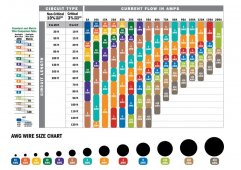There are many answers that can be "right". It just depends on many things. But if you have 600watt of panels to charge a 12v battery, that you can expect to get no more than 600/12 amps to the battery (50a). But you would only get 50a when the panels we perfect to the sun, the sky was clear, and the air could keep the panels cool enough. So if you had a 30a charger, it might be at 30 amps (maxed out) a good part of the day. If you have a 40 amp charger, it might be at 40 amps (maxed out) less of the time. It just depends on many solar and panel conditions.
Someday if you get a larger battery you might discover that even at 40 amps the charging takes way too long to make you smile. So you add another charger but that doesn't help much unless you go up to say 1000watt of panels. Then you could get 80 amps, but only part of the time.
Someday if you get a larger battery you might discover that even at 40 amps the charging takes way too long to make you smile. So you add another charger but that doesn't help much unless you go up to say 1000watt of panels. Then you could get 80 amps, but only part of the time.



